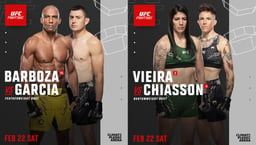Being a matchmaker sounds like it would be the perfect job. Who wouldn’t want to spend their time analyzing a roster to create the most exciting fights possible? Of course, there’s way much more to it than that. “The reality is the iceberg effect,” says Jude Samuel, the man in charge of curating fight cards for BAMMA. “The tip is above the water but underneath is way more than people envisage.”
It sounds like one of the most challenging jobs in MMA. First, he’s got to find the fighters. When you’re populating a card on the regional scene, you don’t have the luxury of being able to easily find high-quality footage of every fighter that’s presented to you, but Samuel finds what he can to get the most accurate picture possible of their skills. Most of the time, there’s enough information out there to sort the contenders from the pretenders.
But ability isn’t the only requirement. An MMA organization needs to make money. There has to be a balance between the athletes with the best skillset, those who will put on a show and those who can bring people to the show, especially if you’re part of a promotion that does arena shows.
“I could make awesome fights, but there’d be empty arenas and no viewers. It’s easy to go down that rabbit hole. The thing is we’re in the entertainment business – no two ways about it. If the fights are not entertaining, we’re simply not doing our jobs.
“It’s no secret if you’re on the undercard, you’re looked at more as someone who can help promote it and help sell tickets to fans and friends. The priorities for those matches are totally different to the top of the card. Ideally, a promotion would like their champion to be their biggest ticket seller, the best on social media, but nobody ticks all the boxes. It’s a matter of finding where that person can be. But I’m also a martial artist and a purist, so I love seeing the best guys go against each other for the right reasons.”
Even if you can find the right pair, there are still a lot of hurdles to clear to get them to the scales and then into the cage. Some fighters – and their managers – will stall, make excessive demands or even try to start bidding wars between promotions. But Samuel says his company isn’t in a position to be squeezed. Every show has a budget and if fighters can’t work within BAMMA’s budget parameters, there’s no fight. If they’re asking too much, they’ll price themselves out.
Those issues are more common now than they were in previous years. Attitudes have shifted from impulsive thoughts of fighting anyone, anywhere, at any time, to being tentative with decisions to manage careers. Some fighters want to have easier fights to build their records, build their profile and earn more money, but Samuel suggests that’s not the best way to go about things.
“I understand the reasons behind it,” he says. “The art of matchmaking has become the art of people management – managing their expectations. You also have to sell the promotion. Guys will jump from promotion to promotion to avoid guys. That’s the guy you’ve got to fight next, and he’s a dangerous motherf**ker. They’ll say it’s not good for their career. Fighting the best guys is good for your career.”
BAMMA built fighters that prove that. “It’s like Tom Duquesnoy did for us,” Samuel adds. He cleaned out the division. Jimi Manuwa was the same. Beat these guys first, test yourself a little bit more, then go to the next level. The money will come.”
One thing that beyond anyone’s control are injuries. All the preparation can be perfect, but a muscle, joint or bone that has other ideas can undercut anything at the most inopportune time. You’d think it might be Samuel’s worst nightmare, but even when a main event is scuppered at the last minute, he’s learned to take it in his stride and help out the men and women that are left without an opponent.
“I don’t want to sound so callous, but it’s happened so many times I’m used to it,” he says. “I do feel for (the fighters) though because I used to compete, so I try to find guys last-minute fights elsewhere in other promotions around Europe. It’s good to be able to do that, to build relationships with everyone so the fighters know we’ll look after them.”
All this difficulty suggests matchmaking may be one of the most stressful jobs in the fight game, but the rewards are there for everyone to see. A solid fight card in an arena full of paying customers is worth all the hassle. “The best part is seeing those exciting fights. Alex Lohore vs. Nathan Jones, Tom Watson vs. ‘Ninja’ (Rua) and the atmosphere they generate. When I can put those together, especially when it’s a UK guy against an international guy, it’s really, really good.”
...









